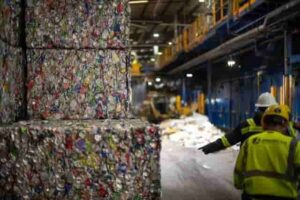As a member of the international community, Indonesia needs to play an active role in ensuring global sustainability. The alarming threat of climate change should be a concern for every country. A comprehensive transformation to a circular economy might be the answer to this dire situation. We believe now is really the time for the Indonesian government to start designing a comprehensive policy reform that changes its economic approach, from linear to circular. It must strategically think about ensuring that this policy is built on a circular economy and work together with related stakeholders for its successful implementation. The concept of a circular economy focuses on redesigning waste to create other valuable goods to use; replacing the concept of take-make-waste (linear economy), so that the economy eventually produces zero waste. According to management consulting firm McKinsey, the circular economy represents a net materials cost savings opportunity of US$340 to US$380 billion in the European Union’s (EU) automotive and other transport sectors. In the fast-moving consumer goods sector, material savings could represent as much as 20 percent of materials input costs incurred by the consumer goods industry at the global level or equal to approximately US$700 billion or 1.1 percent of global gross domestic product (GDP).





